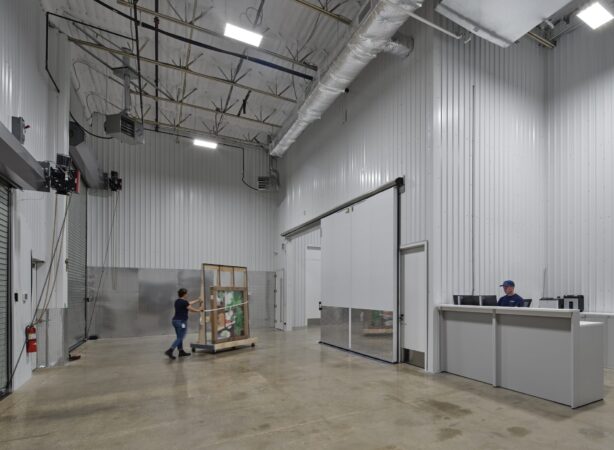Detroit’s cultural infrastructure took a big step forward this summer as Artpack, the city’s longtime leader in art storage and logistics, officially became part of UOVO, one of the nation’s leading providers of fine art, fashion, and wine collection management. The acquisition places Detroit at the center of UOVO’s growing national footprint and underscores the city’s position as a vibrant hub for collectors, institutions, and artists.
Founded in 1981, Artpack has been a trusted partner to some of Detroit’s most prominent cultural institutions and collectors — from the Detroit Institute of Arts to the Charles H. Wright Museum of African American History. Its projects have extended far beyond the region, most recently with the disassembly and shipping of the Jackson House, a key site in the Civil Rights movement, to Greenfield Village in Dearborn. That combination of deep local ties and global expertise made Artpack a natural fit for UOVO’s expansion into the Midwest.

CAROLINE PAGE-KATZ
For Caroline Page-Katz, President and COO of UOVO, Detroit represents more than just a new market.
“Detroit is a world-class city with a rich history of producing and supporting the arts,” she says. “Detroit and the state of Michigan also have some of the most important cultural institutions and private collectors in the country. It was only natural that UOVO would find a home in a city that values creativity and cultural heritage.”
While UOVO is best known for its secure facilities and collection management, Page-Katz emphasizes that its role also has an impact on the local economy. “By providing best-in-class storage, shipping, and collection management, we are supporting the infrastructure of the artistic community, which has always been at the core of our company ethos. It is this kind of work that helps keep the creative economy running smoothly.”
For Detroit’s cultural ecosystem — spanning major museums, independent galleries, and private collections — infrastructure is key. As demand grows, UOVO’s investment provides assurance that institutions – and individuals – can access the same services available in New York, Los Angeles, or Miami, without having to look beyond the Midwest.
UOVO’s entry into Detroit also sends a strong signal about the city’s place in the national art conversation. “UOVO expands in cities where there are active markets, populated with artists, institutions, and collectors,” Page-Katz says. “Detroit is one of the great American cities, and our investment here is a testament to the resilient and thriving creative community of Detroit. We have full confidence in the strength and vitality of the city’s artistic infrastructure, and we hope that our presence will help attract further investments here at large.”

UOVO
That confidence matters. In a global art market that often revolves around New York, Los Angeles, and London, Detroit’s inclusion on UOVO’s map positions it as a rising center for art storage, logistics, and commerce. For local collectors — both established and emerging — the acquisition promises new levels of service, security, and integration.
“Artpack has done an incredible job serving the Detroit community over the past 44 years, and we are honored to build on this legacy and trust with the additional services we offer,” Page-Katz says.
The acquisition also positions Detroit as a strategic hub in UOVO’s national and international network. The company already operates more than 30 facilities nationwide, and its Farmington Hills location will now connect Midwest collectors and institutions directly to UOVO’s proprietary portal, national shuttle service, and international shipping.
“I believe our presence in Detroit speaks to the existing strengths of the market and the high level of activity taking place in the region,” Page-Katz says. “We’re eager to play our part in helping the Midwest grow as a hub for art collectors and enthusiasts.”
UOVO is also mindful of the legacy it is inheriting.
“Recent Artpack projects like the Jackson House are a great example of the caliber of projects that continue to make Detroit a rich hub of cultural activity,” Page-Katz says. “The level of expertise that went into transferring this historic home, where Dr. Martin Luther King planned the Selma to Montgomery March, to the Henry Ford in Dearborn is a strong example of the role that art services play in preserving culture and history, and we are honored to be taking on this role here in Michigan.”
Part of UOVO’s reputation comes from its approach to client service — blending high-security facilities with concierge-level care. Page-Katz says that this model changes how people think about art storage itself.
“Since the start of the company, we have always focused on how we can best meet our clients’ collection management needs,” she says. “That means combining a secure, temperature-controlled environment with concierge-level services and innovative digital tools that provide our customers with ease of accessibility, transparency, and most importantly, peace of mind.”
That philosophy now extends beyond art. With recent expansions into wine and fashion collection management, UOVO is creating a multi-category platform for collectors who want integrated, hospitality-level service across all aspects of their holdings.
Looking ahead, UOVO plans to continue supporting and engaging with Detroit’s cultural community.
“Artpack has done an incredible job supporting the local arts community, and we want to make sure we continue to expand on its legacy,” Page-Katz says. “Whether it’s through education, accessibility, or collaborations, we always evaluate the surrounding community to understand where we can have a meaningful impact.”
One of the first examples is UOVO’s role in transporting works for In the Life: Black Queerness – Looking Back, Moving Forward, opening this fall at Detroit’s Carr Center.
For UOVO, Detroit represents both opportunity and alignment. With its history of cultural innovation, its network of institutions, and its growing community of collectors, the city offers fertile ground for the company’s first fine art facility in the Midwest.
As Page-Katz puts it, “We see a vibrant and growing cultural sector in Detroit that we can help serve… we are excited to be part of the renaissance that is taking place.”
As always, be sure to subscribe to our newsletter for regular updates on all things Detroit.























